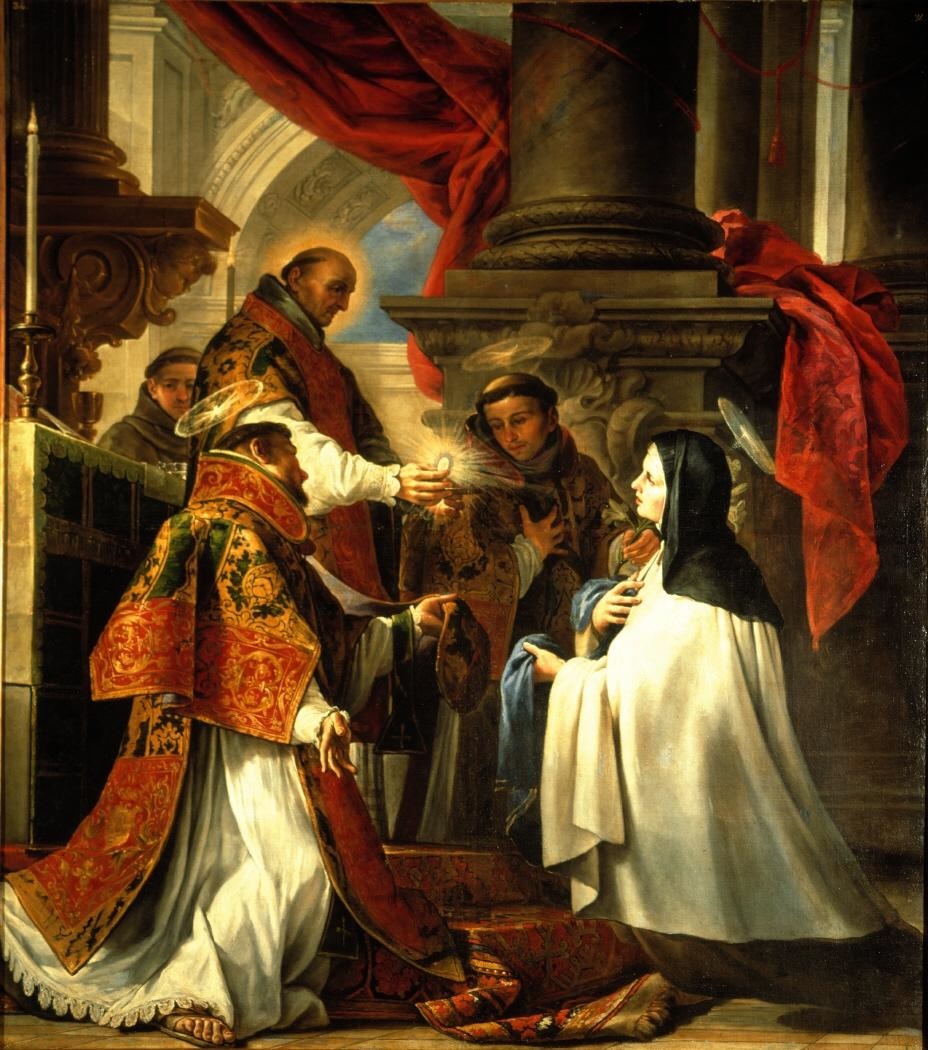St. Teresa de Avila
(Image of St. Teresa receiving Holy Communion, taken from Wikimedia)
(The following is the legend from the breviary for St. Teresa of Jesus, as quoted in Dom Prosper Guéranger's entry in The Liturgical Year for 15 October, in Volume XIV of the 1983 Marian House edition of the English translation by the Benedictines of Stanbrook.)
"The virgin Teresa was born at Avila in Spain, of parents illustrious for nobility and virtue. She was brought up by them in the fear of God.; and while still very young, she gave admirable promise of her future sanctity. While reading the acts of the holy martyrs, she was so enkindled with the fire of the [H]oly Spirit, that she ran away from home, resolved to cross over to Africa, and there to lay down her life for the glory of Jesus Christ and the salvation of souls. She was brought back by her uncle; but her heart still burned with the desire of martyrdom, which she endeavoured to satisfy by alms-deeds and other works of piety, weeping continually to see herself deprived of that happy lot. On the death of her mother she begged the blessed Virgin to be a mother to her; and she gained her request, for ever afterwards the Mother of God cherished her as a daughter. In the twentieth year of her age she joined the nuns of St. Mary of Mount Carmel; and spent eighteen years in that monastery, enduring severe illnesses and many trials. While she was thus courageously battling in the ranks of Christian penance, she was deprived of the support of heavenly consolations, in which the saints usually abound even on this earth."
"She was adorned with angelic virtues; and her charity made her solicitous not for her own salvation alone, but for that of all mankind. Inspired by God, and with the approbation of [Pope] Pius IV she restored the Carmelite rule to its primitive severity, and caused it to be thus observed first the women and then by the men. The all-powerful blessing our merciful God was evident in this work; for, though destitute of all human aid, and moreover opposed by many of the great ones of the world, the virgin was able, in her poverty, to build thirty-two monasteries. She wept continually over the blindness of infidels and heretics, and offered to God the voluntary maceration of her body to appease the divine anger, on their behalf. Her heart burned like a furnace of divine love; so that once she saw an angel piercing it with a fiery dart, and heard Christ say to her, taking her hand in [H]is: Henceforward, as my true bride, thou shalt be zealous for mine honour. By our Lord's advice, she made the exceedingly difficult vow, always to do what she conceived to be most perfect. She wrote many works, full of divine wisdom, which arouse in the minds of the faithful the desire of their heavenly country."
"Whereas Teresa was a pattern of every virtue, her desire of bodily mortification was most ardent; and in spite of the various maladies which afflicted her, she chastised her body with hairshirts and iron chains, scourged herself with sharp disciplines or with bundles of nettles, and sometimes rolled among thorns. She would often speak thus to God: O Lord, let me either suffer or die; for she considered that as long as she was absent from the fountain of life, she was dying daily and most miserably. She was remarkable for her gift of prophecy, and was enriched to such a degree by our Lord with his divine favours, that she would often beg him to set bounds to his gifts, and not to blot out the memory of her sins so speedily. Consumed by the irresistible fire of divine love rather than by disease, after receiving the last Sacraments, and exhorting her children to peace, charity, and religious observance, she expired at Alba, on the day she had foretold; and her most pure soul was seen ascending to God in the form of a dove. She died at the age of sixty-seven, in the year 1582, on the Ides of October according to the corrected Roman calendar. Jesus Christ was seen present at her death-bed, surrounded by angels; and a withered tree near her cell suddenly burst into blossom. Her body has remained incorrupt to the present day, distilling a fragrant liquor; and is honored with pious veneration. She made illustrious by miracles both before and after her death; and [Pope] Gregory XV enrolled her among the saints."



0 Comments:
Post a Comment
<< Home